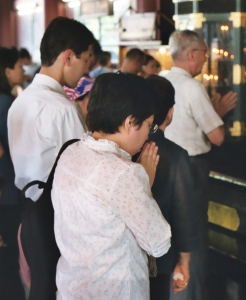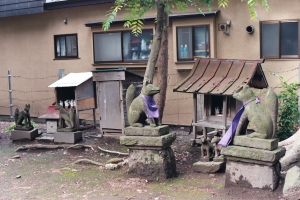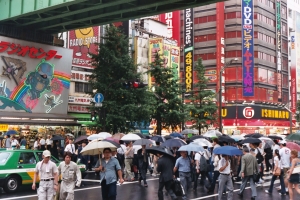Background on Japan

Prayers at Asakusa Temple, Tokyo
|
Japanese are almost exclusively Shinto-Buddhist in their beliefs. Shinto is the indiginous, animistic religion of Japan. Similar to
numina of early Latin religion, shinto believes that everything has a
spirit (tree spirit, river spirit, fox spirit, etc.) These
spirits seem to be largely indifferent to humans and their worship seems
to consist mostly of bribing them with monetary offerings to acting in a
way that benefits (or at least, does not harm) humans. Buddhism
seems to be rather different from Indian Buddhism and is usually only
invoked for death rites. I did not hear a consistent theology but
it appears that a dead person is prayed for by the living so that the
prayers will influence the gods to bring the deceased to “Heaven”, which
appears to be slightly more desireable than the “Hell”
alternative. Certainly the Christian notion of Heaven being
tangibly good does not appear to enter into Buddhist thought, nor can
one be certain whether one will reach “Heaven”.

Fox shrines at Inari Shrine,
Hirosaki City
|
My impression is that the older Japanese are firm Shinto-Buddhist
believers and the youger Japanese are just-in-case believers. I am
told that most of the younger or urban population will claim to be
atheistic, yet the shrines are full of prayers for success in
tests. And for a few hundred yen, why not offer a prayer just in
case? The vast majority of the population knows nothing of the
theology that they occasionally practice. It seems that the
Buddhist death rites are of particular importance, however. While
nobody seems to mind if one does not visit the Shinto shrines, or to a
lesser extent, neglect the worship of recent ancestors, during funerals
it is imperative to offer incense to the deceased. Failure to pray
for the ascention of their souls shows a lack of concern for the
deceased and effectively insults them (and the rest of the family).
Judging by the comments of the Japanese believers, the largest family
opposition to a family member becoming a Christian is the fear that
Christianity is a cult. Once they see that the new Christian does
not disturb the social equilibrium, the Christian is often permitted to
practice in peace. One woman became a Christian and her husband
said he would divorce her if she was baptized before he retired, as he
presumably feared that if she were known to be a Christian it would
adversely affect his career. As soon as he retired, she was
baptized and remains happily married. There is, however, the
sticking point of the funeral. Another woman’s husband said that
he would divorce her if she did not offer incense at his parent(s)’
funeral. (They have not yet died, so at present, no problems.)

Akihabara Electric Town
|
In some respects Japan’s spiritual state is similar to that of the
West. With the citizens of the largest economies living with the
highest standard of living in the history, there is little apparent need
for God’s provision. Science, with its seeming offer of a purely
natural explanation of the world, is largely responsible for this
opulence, so God is “provably” unnecessary. Without a God, then,
Mankind is left only with a need to satiate itself in whatever moral
structure it deems best. In Japan, breaking the “moral” rules is
not a moral failing; getting caught and adversely affecting the
harmony of the group is the failing. So husbands frequently have
lovers (often with little effort taken to hide it) and politicians
frequently resign because of scandals. Yet it was not wrong to do
the action, it was wrong to get caught.
Still, although Japan has the hard-hardedness of the West, it does
retain the awareness of the supernatural that the West has explained
away. Many people have had visitations from spirits, sort of like
“hauntings” in the U.S. except that it is not uncommon. (They go
away if the person becomes a Christian.) There even seems to be a
concept of a “living god”, one of which apparently lived in the town
where we taught English.
Japan is quite resistant to the Gospel, much more so than the nearby
Asian nations. China has many people becoming Christians and a
church in either Indonesia or the Philippines (I am not sure which) can
usually be self-supporting (about 30 people) in a few years. In
Japan the average time for a person to accept Jesus’ message is 10
years. Many rural churches are 20 years old and still not
self-supporting yet. However, there is a growing disatisfaction
with the open adultery of men, a feeling that the Buddhist priests are
money-hungry
1, and a concern about
the failure of politicians to correct Japan’s decade-long recession that
may change Japan’s openness sometime in this generation.
1 Each temple serves a region
and if you live in that region, you pay a temple “tax.” Technically this is optional, but in a strong mono-culture one doesn’t
rock the boat, so people pay it. This tax is set by the priests of
that temple and many priests charge rather high fees and are
perhaps more worldly than their position dictates.


